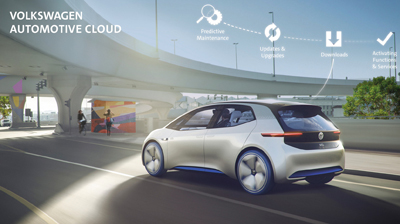
Vehicle manufacturer Volkswagen is creating a cloud-based marketplace to sell extra vehicle functions and online services that could generate revenues of more than €1 billion by 2025.
It wants to connect its entire fleet to the digital service so drivers – and eventually autonomous vehicle passengers – will be able to source services while on the move.
Proposed services will range from parking to deliveries and car sharing.
As part of the plans, it has bought a controlling stake in fleet-connectivity provider WirelessCar from Volvo.
Juergen Stackmann, VW brand head of sales, told reporters that revenues would be generated from 2020 onwards.
Volkswagen’s connected car push reflects massive industry-wide investment in new mobility services.
Last year, the European Commission cleared the merger of Daimler and BMW’s mobility operations, which will see the creation of six joint ventures.
The joint services will encompass their free-floating car sharing services, via DriveNow (BMW) and car2go (Daimler), ride-hailing, parking services, charging, other on-demand mobility services and a sixth business to oversee brands and licensing.
The merger between two intense automotive rivals emphasises the challenge facing OEMs as they try to develop mobility businesses that are large enough to generate the economies of scale needed to operate profitably.
While there were competition concerns over the merger, the European Commission imposed strict rules to encourage competition, particularly in the area of third-party mobility apps provided on smartphones.
The European Commission found that, after the merger of their mobility operations, Daimler and BMW would have the ability and incentive to shut out rival providers of integrator apps, to the benefit of Daimler's own integrator app moovel and potentially restrict rival car-sharing providers, to the benefit of their own car-sharing services.
To address the European Commission's competition concerns, Daimler and BMW offered concessions in key cities, which will include providing access to their systems through APIs for third-party mobility solution aggregator platforms, while rival car-sharing providers will be offered a presence on Daimler’s moovel integrator app.
The European Commission said this ensured that smaller competitors could enter the market in any of the cities concerned and be immediately visible on moovel, while third-party integrator apps could display DriveNow and car2go to customers seeking a mobility solution.
Industry commentators suggest Volkswagen is years behind rivals Daimler and BMW after the lengthy distraction and cost of the diesel-emissions cheating scandal, but is making swift progress to develop competitive services.
BMW already offers a wide-ranging app store for cars, branded as ConnectedDrive, which offers services ranging from parking to a concierge.

